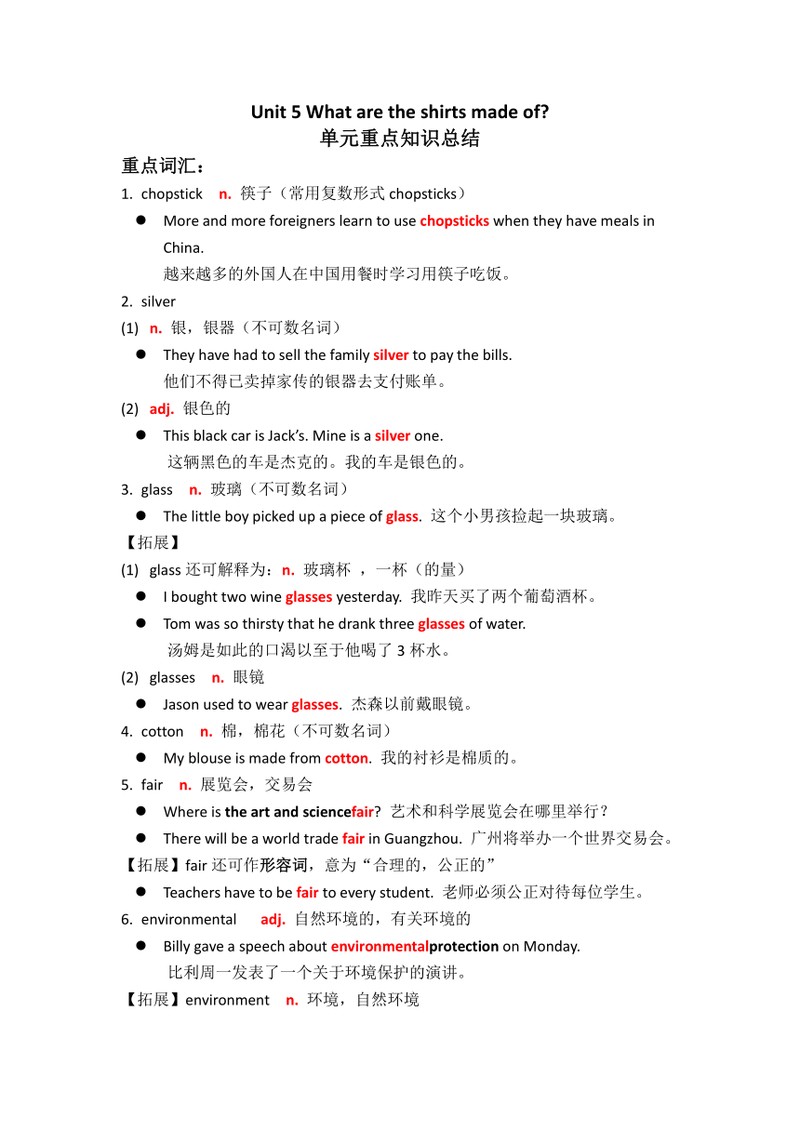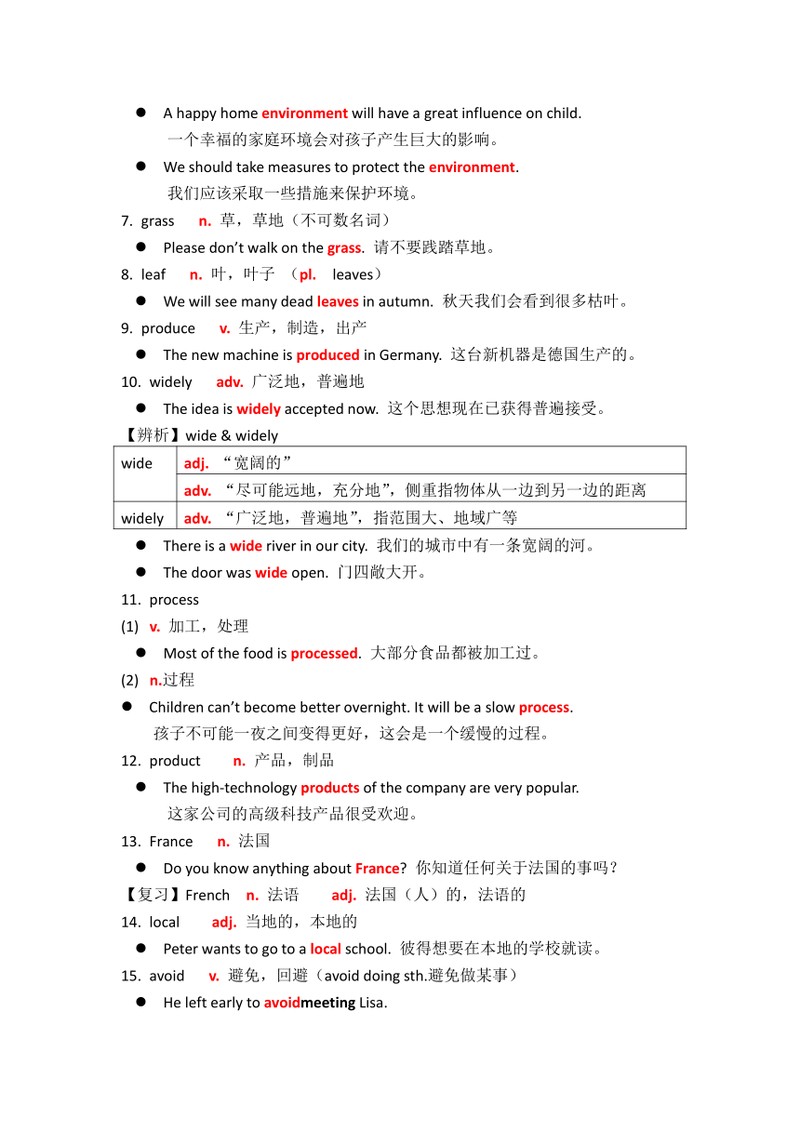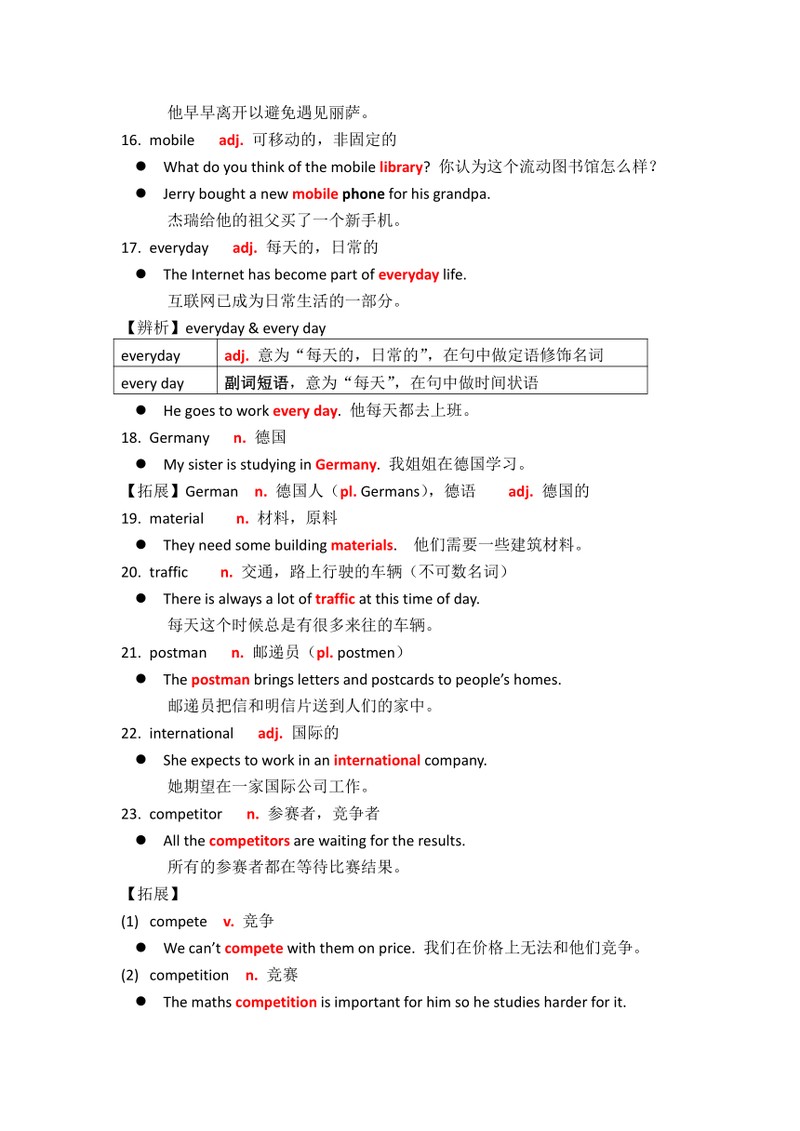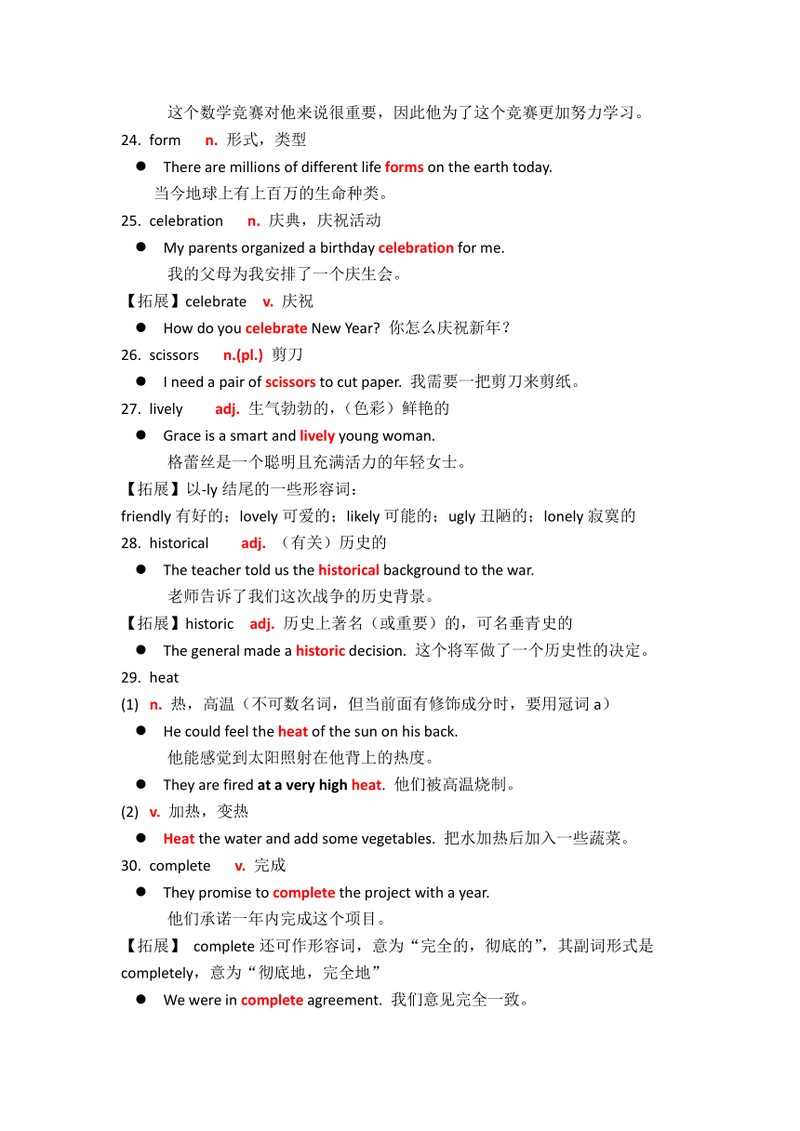 资源简介
资源简介
Unit 5 What are the shirts made of
单元重点知识总结
重点词汇:
chopstick n. 筷子(常用复数形式chopsticks)
More and more foreigners learn to use chopsticks when they have meals in China.
越来越多的外国人在中国用餐时学习用筷子吃饭。
silver
n. 银,银器(不可数名词)
They have had to sell the family silver to pay the bills.
他们不得已卖掉家传的银器去支付账单。
adj. 银色的
This black car is Jack’s. Mine is a silver one.
这辆黑色的车是杰克的。我的车是银色的。
glass n. 玻璃(不可数名词)
The little boy picked up a piece of glass. 这个小男孩捡起一块玻璃。
【拓展】
glass还可解释为:n. 玻璃杯 ,一杯(的量)
I bought two wine glasses yesterday. 我昨天买了两个葡萄酒杯。
Tom was so thirsty that he drank three glasses of water.
汤姆是如此的口渴以至于他喝了3杯水。
glasses n. 眼镜
Jason used to wear glasses. 杰森以前戴眼镜。
cotton n. 棉,棉花(不可数名词)
My blouse is made from cotton. 我的衬衫是棉质的。
fair n. 展览会,交易会
Where is the art and sciencefair 艺术和科学展览会在哪里举行?
There will be a world trade fair in Guangzhou. 广州将举办一个世界交易会。
【拓展】fair还可作形容词,意为“合理的,公正的”
Teachers have to be fair to every student. 老师必须公正对待每位学生。
environmental adj. 自然环境的,有关环境的
Billy gave a speech about environmentalprotection on Monday.
比利周一发表了一个关于环境保护的演讲。
【拓展】environment n. 环境,自然环境
A happy home environment will have a great influence on child.
一个幸福的家庭环境会对孩子产生巨大的影响。
We should take measures to protect the environment.
我们应该采取一些措施来保护环境。
grass n. 草,草地(不可数名词)
Please don’t walk on the grass. 请不要践踏草地。
leaf n. 叶,叶子 (pl. leaves)
We will see many dead leaves in autumn. 秋天我们会看到很多枯叶。
produce v. 生产,制造,出产
The new machine is produced in Germany. 这台新机器是德国生产的。
widely adv. 广泛地,普遍地
The idea is widely accepted now. 这个思想现在已获得普遍接受。
【辨析】wide & widely
wide adj. “宽阔的”
adv. “尽可能远地,充分地”,侧重指物体从一边到另一边的距离
widely adv. “广泛地,普遍地”,指范围大、地域广等
There is a wide river in our city. 我们的城市中有一条宽阔的河。
The door was wide open. 门四敞大开。
process
v. 加工,处理
Most of the food is processed. 大部分食品都被加工过。
n.过程
Children can’t become better overnight. It will be a slow process.
孩子不可能一夜之间变得更好,这会是一个缓慢的过程。
product n. 产品,制品
The high-technology products of the company are very popular.
这家公司的高级科技产品很受欢迎。
France n. 法国
Do you know anything about France 你知道任何关于法国的事吗?
【复习】French n. 法语 adj. 法国(人)的,法语的
local adj. 当地的,本地的
Peter wants to go to a local school. 彼得想要在本地的学校就读。
avoid v. 避免,回避(avoid doing sth.避免做某事)
He left early to avoidmeeting Lisa.
他早早离开以避免遇见丽萨。
mobile adj. 可移动的,非固定的
What do you think of the mobile library 你认为这个流动图书馆怎么样?
Jerry bought a new mobile phone for his grandpa.
杰瑞给他的祖父买了一个新手机。
everyday adj. 每天的,日常的
The Internet has become part of everyday life.
互联网已成为日常生活的一部分。
【辨析】everyday & every day
everyday adj. 意为“每天的,日常的”,在句中做定语修饰名词
every day 副词短语,意为“每天”,在句中做时间状语
He goes to work every day. 他每天都去上班。
Germany n. 德国
My sister is studying in Germany. 我姐姐在德国学习。
【拓展】German n. 德国人(pl. Germans),德语 adj. 德国的
material n. 材料,原料
They need some building materials. 他们需要一些建筑材料。
traffic n. 交通,路上行驶的车辆(不可数名词)
There is always a lot of traffic at this time of day.
每天这个时候总是有很多来往的车辆。
postman n. 邮递员(pl. postmen)
The postman brings letters and postcards to people’s homes.
邮递员把信和明信片送到人们的家中。
international adj. 国际的
She expects to work in an international company.
她期望在一家国际公司工作。
compe***** n. 参赛者,竞争者
All the compe*****s are waiting for the results.
所有的参赛者都在等待比赛结果。
【拓展】
compete v. 竞争
We can’t compete with them on price. 我们在价格上无法和他们竞争。
competition n. 竞赛
The maths competition is important for him so he studies harder for it.
这个数学竞赛对他来说很重要,因此他为了这个竞赛更加努力学习。
form n. 形式,类型
There are millions of different life forms on the earth today.
当今地球上有上百万的生命种类。
celebration n. 庆典,庆祝活动
My parents organized a birthday celebration for me.
我的父母为我安排了一个庆生会。
【拓展】celebrate v. 庆祝
How do you celebrate New Year 你怎么庆祝新年?
scissors n.(pl.) 剪刀
I need a pair of scissors to cut paper. 我需要一把剪刀来剪纸。
lively adj. 生气勃勃的,(色彩)鲜艳的
Grace is a smart and lively young woman.
格蕾丝是一个聪明且充满活力的年轻女士。
【拓展】以-ly结尾的一些形容词:
friendly有好的;lovely可爱的;likely可能的;ugly丑陋的;lonely寂寞的
historical adj. (有关)历史的
The teacher told us the historical background to the war.
老师告诉了我们这次战争的历史背景。
【拓展】historic adj. 历史上著名(或重要)的,可名垂青史的
The general made a historic decision. 这个将军做了一个历史性的决定。
heat
n. 热,高温(不可数名词,但当前面有修饰成分时,要用冠词a)
He could feel the heat of the sun on his back.
他能感觉到太阳照射在他背上的热度。
They are fired at a very high heat. 他们被高温烧制。
v. 加热,变热
Heat the water and add some vegetables. 把水加热后加入一些蔬菜。
complete v. 完成
They promise to complete the project with a year.
他们承诺一年内完成这个项目。
【拓展】 complete还可作形容词,意为“完全的,彻底的”,其副词形式是completely,意为“彻底地,完全地”
We were in complete agreement. 我们意见完全一致。
He has completely forgotten my name. 他完全把我的名字给忘了。
常用短语:
be made of 由......制成(看得出原材料)
The chair is made of wood. 这把椅子有木头制成。
【拓展】
be made from 由......制成(看不出原材料)
Wine is made from grapes. 葡萄酒是由葡萄酿制的。
be made in 在......制造
These products are made in China. 这些产品都是在中国制造的。
be made for 为了......制造
The new type of mobile phone is made for the old.
这款新型手机是为了老年人制造的。
be made into 被制成......
These grapes are made into wine. 这些葡萄被制成葡萄酒。
be famous for=be known for 因......而闻名
Liu Cixin is famous/known for his novels. 刘慈欣因他的小说而闻名。
【拓展】
be famous as=be known as 作为......为闻名
Taylor Swift is famous/known as a singer.
泰勒 斯威夫特作为一名歌手而闻名。
be famous to sb. =be known to sb. 为某人所熟知
Shanghai is famous/known to people all over the world.
上海为全世界的人所知晓。
as far as I know 据我所知
As far as I know, Tina is good at dancing. 据我所知,缇娜擅长跳舞。
by hand 用手,手工
The bags are made by hand. 这些包都是手工制成的。
send for发送,请......来(帮忙等)
His son has a fever so he has sent for a doctor. 他的儿子发烧了,因此他请了一个医生来。
She sent for the latest report. 她要求把最新的报告给她送来。
no matter 无论,不论
【复习】引导让步状语时,no matter+特殊疑问词=特殊疑问词+-ever
No matter where you go, I’ll go will you.
=Wherever you go, I’ll go will you. 无论你去哪里,我都和你一起去。
No matter what he says, she will agree.
=Whatever he says, she will agree. 无论他说什么,她都同意。
everyday things日用品
It’s kind of you to offer us some everyday things.
你为我们提供日用品,你真是太好了。
find out 查明,弄清
The teacher found out why he was absent from classes yesterday.
老师弄清楚了他昨天为什么旷课。
go on a vacation 度假
Where did you go on a vacation 你到哪里度假?
fly a kite 放风筝
My daughter invited me to fly a kite with her.
我女儿邀请我和她一起去放风筝。
turn(...) into 变成,把......变成
Life if full of unexpected, and bad luck may turn into a good thing.
生活充满了意外,厄运可能会变成好事。
The witch turned the prince into a frog. 女巫把王子变成了一只青蛙。
be covered with 被......覆盖
They are made of bamboo and covered with paper.
它们是用竹子做的,上面覆盖着纸。
be seen as 被视作......
Children are seen as the future of a country. 孩子被视作一个国家的未来。
paper cutting 剪纸
Paper cutting is a special form of traditional art.
剪纸是传统艺术的一种特殊形式。
be used for 被用于......
The glass is used for drinking water. 这个玻璃杯是用来喝水的。
单元语法:
被动语态
当主语是动作的承受者时,谓语要用被动语态。
被动语态的构成
被动语态的构成形式是:助动词be+及物动词的过去分词。
助动词be有人称、时态和数的变化,其变化规则与be作为连系动词时完全一样。本单元主要讲解的是一般现在时的被动语态。
肯定句 主语+am/is/are+过去分词(+by...).
否定句 主语+am/is/are+not+过去分词(+by...).
一般疑问句 Am/Is/Are+主语+过去分词(+by...)
特殊疑问句 特殊疑问词+am/is/are+主语++过去分词(+by...)
句式
用法
用法 例句
表示经常性或习惯性发生的被动动作 The shoes are polished every day by Jack. 杰克每天都把鞋擦亮。
表示规律性的被动动作 The Olympic Games are held once every four years. 奥运会每四年举办一次。
表示长期处于某种被动的状态 The top of the mountain is covered by snow all the year round. 这座山的山顶终年被积雪覆盖。
表示按照规定、法律等禁止性的动作 Smoking is not allowed in the hall. 大厅内不准吸烟。
主动语态转变为被动语态的步骤
第一步:将主动语态的宾语改为被动语态的主语;
第二步:将主动语态的谓语动词改为“be+及物动词过去分词”结构;
第三步:将主动语态的主语改为“by+宾语”,放在谓语动词之后(通常可省略)。
主动语态转换为被动语态的几种情况:
主动语态的结构是“主语+谓语+宾语”时转换成被动语态
主动语态:They eat some apples.
主 谓 宾
被动语态:Some apples are eaten by them.
主动语态的结构是“主语+谓语+间接宾语+直接宾语”是转换成被动语态
有些及物动词,如tell, give, send, bring, take等,变为被动语态时,须在被保留的间接宾语前加to;
主动语态:He tells his son a story every night.
主 谓 间宾 直宾
被动语态:His son is told a story by him every day. (间宾转换成被动句的主语)
A story is told to his son by him every night.(直宾转换成被动句的主语)
有些及物动词,如buy,变为被动语态时,须在被保留的间接宾语前加for;
主动语态:My parents buy me a gift every year.
主 谓 间宾 直宾
被动语态:A gift is bought for me by my parents every year.
(直宾转换成被动句的主语)
【注意】此种情况下不能把间接宾语转换成被动句的主语。
主动语态的结构是“主语+谓语+宾语+宾语补足语”是转换成被动语态
主动语态:She considers him her best friend.
主 谓 宾 宾补
被动语态:He is considered (to be) her best friend by her.
【注意】
宾语补足语不能转换成被动句的主语。
主动语态中,在make、hear、see、watch和notice等词后接省略to的不定式做宾语补足语,但在被动语态中,to不可省略
主动语态:We often hear him play the guitar.
被动语态:He is often heardtoplay the guitar by us.
展开更多......
收起↑
 资源预览
资源预览




 资源预览
资源预览



